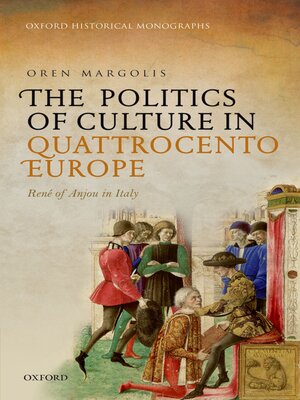The Politics of Culture in Quattrocento Europe
ebook ∣ René of Anjou in Italy · Oxford Historical Monographs
By Oren Margolis

Sign up to save your library
With an OverDrive account, you can save your favorite libraries for at-a-glance information about availability. Find out more about OverDrive accounts.
Find this title in Libby, the library reading app by OverDrive.



Search for a digital library with this title
Title found at these libraries:
| Loading... |
The poet-king without a throne appears here in an entirely new light. In The Politics of Culture in Quattrocento Europe: René of Anjou in Italy, Oren Margolis explores how this French prince and exiled king of Naples (1409-1480) engaged his Italian network in a programme of cultural politics conducted with an eye towards a return to power in the peninsula. Built on a series of original interpretations of humanistic and artistic material (chiefly Latin orations and illuminated manuscripts of classical texts), this is also a case study for a 'diplomatic approach' to culture. It recasts its source base as a form of high-level communication for a hyper-literate elite of those who could read the works created by humanist and artistic agents for their constituent parts: the potent words or phrases and relevant classical allusions; the channels through which a given work was commissioned or transmitted; and then the nature of the network gathered around a political agenda. This is a volume for all those interested in the politics and culture of later medieval Europe and Renaissance Italy: the kings of France and dukes of Burgundy, the Medici, the Sforza, the Venetians, and their armies, ambassadors, and adversaries all appear here; so do Giovanni Bellini, Andrea Mantegna, Guarino of Verona, and their respective intellectual and artistic circles. Emerging from it is a challenge to conventional interpretations of the politics of humanism, and a new vision of the Quattrocento: a century in which the Italian Renaissance began its takeover of Europe, but in which Renaissance culture was itself shaped by its European political, social, and diplomatic context.






